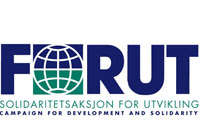
 |
Home > English > Home > A Global Alcohol Strategy adopted by the World Health Assembly

A Global Alcohol Strategy adopted by the World Health Assembly
The World Health Assembly passed on the 20th of May a resolution endorsing a Global Strategy to Reduce the Harmful Use of Alcohol. It was a very interesting discussion in the Assembly where some 35 member states spoke - all in favour of the strategy. Three NGOs/civil society alliances also made statements supporting the resolution.
21.05.2010
- The decision of the World Health Assembly on a Global Alcohol Strategy is a very important step forward in the global struggle for public health and welfare, says General Secretary Morten Lønstad of FORUT; The Norwegian Campaign for Development and Solidarity.
Mr. Lønstad says that the decision is of particular importance for the developing world – and for all NGOs concerned with global development issues. – It is a sad fact that drunken behaviour is closely linked to many critical development issues; like poverty, marginalization, gender-based violence and HIV/AIDS. A concerted effort by the international community to reduce harmful drinking, under the leadership of WHO, is therefore very good news in particular for the poor and for children and women all over the world.
APA: "A historic decision"
The Global Alcohol Policy Alliance (GAPA) warmly welcomes the new Alcohol Strategy and calls this a “historic decision” by the World Health Organization. GAPA has represented many NGOs in the process leading up to the adoption of the strategy. GAPA chairman Derek Rutherford said: "Concerted action to reduce global alcohol problems is long overdue. Today's decision by the World Health Assembly is an important first step to address them. The strategy goes a long way in recognizing the transnational aspects of the alcohol issue. GAPA appreciates the wide range of supportive statements by WHO member states from both developed and developing countries in the discussion."
In the two-hour-long debate at the Assembly, all member states acknowledged the harmful use of alcohol as a major public health issue. In the many member-state interventions, delegates pointed to the global aspects of the problem and requested that alcohol problems receive a higher priority at WHO and that more resources be allocated to address those problems and to implement the new global strategy.
Evidence-based measures
The important concerns identified in the debate included the increasing culture of binge drinking among young people world wide, and the expanding influence of the marketing and advertising for alcoholic beverages. Delegates welcomed the varied evidence-based measures included in the strategy and their potential for successfully addressing alcohol problems. The strategy highlights the effectiveness of focusing on policies regarding pricing, availability and marketing of alcohol. The WHA resolution was adopted with one amendment proposed by Thailand on behalf of the SEARO countries asking for adequate financial and human resources for implementation
Alcohol policy - a development issue
FORUT points to the fact that alcohol constitutes a double-sided problem in the developing world. - On one hand, drinking is in many places a severe and additional burden to the poor and underprivileged. On the other hand we also see that new drinking habits, increasing consumption levels, and rising problems occur among a growing middle class in a number of countries. Planned and evidence-based strategies is the best way to prevent new problems from arising, and the new WHO Strategy points at many effective alternative actions for governments as well as for NGOs, says Morten Lønstad of FORUT.
A brief presentation of the Strategy can be found at the ADD web site.
All relevant documents, including the including the draft Alcohol Strategy in six languages, can be found at the WHO web site .
![]()
![]()

FORUT, Solidaritetsaksjon for utvikling
Boks 300, 2803 Gjøvik, Tlf: 611 87400, Fax: 611 87401, E-post: forut@forut.no
FORUTs kontonr: 7220.05.36348
